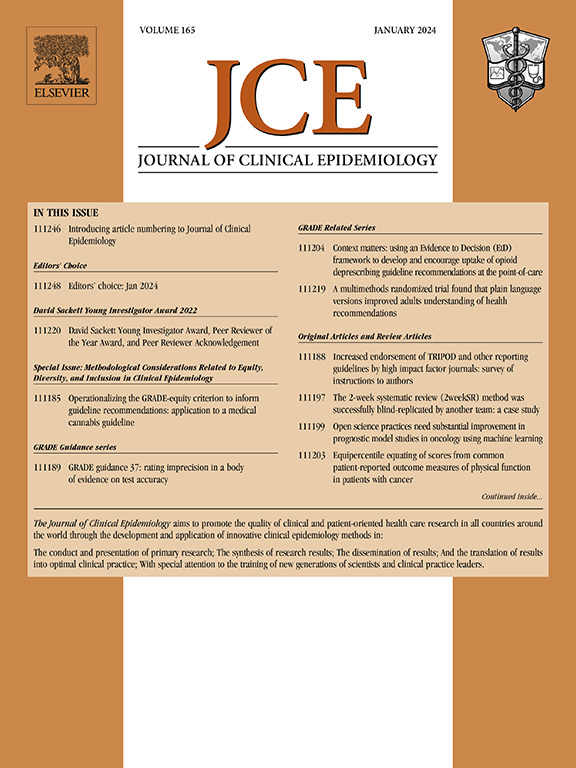有时不同,但通常相同:指导如何在试验中招募和保留人员,以提高少数民族群体的参与:英国的一项定性访谈研究。
IF 5.2
2区 医学
Q1 HEALTH CARE SCIENCES & SERVICES
引用次数: 0
摘要
目的:少数民族群体在试验中的代表性一直不足,限制了研究结果的普遍性和公平性。本研究探讨了少数民族背景的现有招聘和保留干预措施的可接受性。研究设计和背景:我们对20名来自英国少数民族的成年人进行了半结构化访谈,这些成年人被认为是“非白人英国人”。我们采用最大变异有目的抽样,以确保年龄、性别、种族、城乡居住和宗教背景的多样性。使用归纳和演绎方法对数据进行了主题分析。结果:20名成年人(20-70岁,60%为女性)参与了访谈。研究结果分为两个主要领域:针对少数民族群体的主题和与招聘和保留干预措施有关的主题。文化和语言方面的考虑被认为是有效征聘和留用的关键。对于家庭成员是否参与参与试验的决策,意见不一。在少数民族群体内部建立信任被认为是鼓励参与的必要条件。与会者:强调在收集和使用种族数据时需要透明的沟通,并对潜在的象征主义表示担忧。所有与会者都强调了提供明确信息以支持知情决策的重要性,包括为什么要收集他们的族裔数据。大多数参与者更喜欢收到来自全科医生(gp)的邀请函,因为他们认为他们更值得信赖,因为他们已经建立了关系,而不是来自未知来源的短信或电子邮件,而一些人更喜欢电子邮件,因为他们更有可能阅读这些邮件。参与者更喜欢分层信息方法,这种方法简明扼要,但优先考虑风险、益处和试验相关性的内容。这些偏好与之前其他小组的报告一致。较高的财政奖励有时被视为试验风险增加的指标。结论:招聘和保留策略必须根据少数民族的需求和偏好进行定制和共同设计。关于试验目的、风险和益处的清晰、文化敏感和透明的沟通对于建立信任和加强参与的知情决策至关重要。包容性做法对于改善研究中的公平代表性至关重要。本文章由计算机程序翻译,如有差异,请以英文原文为准。
Sometimes different, often the same: guidance on how recruitment and retention in trials need to be tailored to enhance participation of ethnic minority groups: a qualitative interview study in England
Objectives
Ethnic minority groups are consistently underrepresented in trials, limiting the generalizability and equity of research outcomes. This study explored the acceptability of existing recruitment and retention interventions for individuals from ethnic minority backgrounds.
Study Design and Setting
We conducted semi-structured interviews with 20 adults from ethnic minority groups identified as “non-White British” in England. We used maximum variation purposive sampling to ensure diversity in age, gender, ethnicity, urban/rural residence, and religious background. Data were analyzed thematically using an inductive and deductive approach.
Results
Twenty adults (aged 20–70; 60% female) took part in the interviews. Findings were categorized into two main areas: themes specific to ethnic minority groups and themes related to recruitment and retention interventions. Cultural and linguistic considerations were considered critical for effective recruitment and retention. Opinions were mixed on the involvement of family members in decision-making about trial participation. Building trust within ethnic minority groups was deemed essential for encouraging participation. Participants highlighted the need for transparent communication when collecting and using ethnicity data and expressed concerns about potential tokenism. All participants emphasized the importance of providing clear information to support informed decision-making. Most participants preferred receiving invitation letters from their general practitioners (GPs), viewing them as more trustworthy, while some favored emails, as they were more likely to read them. Participants preferred a layered information approach that was concise but prioritized content on risks, benefits, and trial relevance. Higher financial incentives were sometimes perceived as indicators of increased trial risk.
Conclusion
Recruitment and retention strategies must be tailored and co-designed to reflect the needs and preferences of ethnic minority groups. Clear, culturally sensitive, and transparent communication about trial aims, risks, and benefits is essential for building trust and enhancing informed decision-making for participation. Inclusive practices are vital for improving equitable representation in research.
Plain Language Summary
We spoke with 20 adults from a range of ethnic backgrounds across England. Participants emphasized that clear, honest communication and respect for different cultures and languages are essential. Many preferred receiving information from their general practitioner (GP) due to existing relationship, as it felt more trustworthy than unsolicited text messages or emails from an unknown source. Some preferred emails over letters. People wanted simple, easy-to-read summaries about the study's purpose, the risks and benefits, and the reason for collecting information on their ethnicity. Some were concerned that offering higher financial payment made the research seem more riskier. Overall, we found that people conducting trials should take the time in building trust, communicating clearly, and considering cultural needs. This can help make research more inclusive and ensure fair representation of people from all backgrounds.
求助全文
通过发布文献求助,成功后即可免费获取论文全文。
去求助
来源期刊

Journal of Clinical Epidemiology
医学-公共卫生、环境卫生与职业卫生
CiteScore
12.00
自引率
6.90%
发文量
320
审稿时长
44 days
期刊介绍:
The Journal of Clinical Epidemiology strives to enhance the quality of clinical and patient-oriented healthcare research by advancing and applying innovative methods in conducting, presenting, synthesizing, disseminating, and translating research results into optimal clinical practice. Special emphasis is placed on training new generations of scientists and clinical practice leaders.
 求助内容:
求助内容: 应助结果提醒方式:
应助结果提醒方式:


